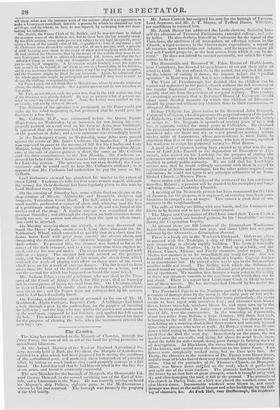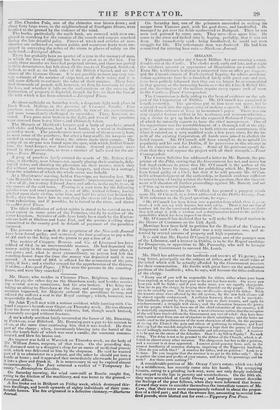lEbe COuntrii.
The King has transmitted to the Marquis of Chandos, through the Privy Purse, the sum of 50/. in aid of time fund for giving premiums to agricultural labourers.
At the Annual Meeting of the West of England Agricultural So. eiety, recently held at Bath, the President, the Marquis of Lansdowne, rekrred to a plan which had been proposed for hi ttering the condition of the agricultural poor, and rendering them independent of parochial relief, by letting so much land as they could properly manage at a fair rental. His Lordship said that he had himself tried it for the last five 4r six years, and found it eminently successful.
The new Member for the borough of Morpetb, the Honourable Ed- ward George Howard, is the second surviving son of the Earl of Car- lisle, and a Lieutenant in the Navy. Ile was recently serving on board his Majesty's ship Pelican, eighteen guns, in the Mediterranean ; whence he has just returned. The borough was formerly the property
the Ord family. Mr. James Cornish has resigned his seat for the borough of Totness. Lord Seymour, and Mr. J. T. Mayne, of Teffont House, Wilt,hire, are candidates to succeed him.
Mr. Josiah Bower has addressed the Leeds electors, declaring him- self the advocate of Triennial Parliaments, extended suffrage, and vote
by ballot. He also declares himself an "advocate for the repeal of the
Corn-laws, the abolition of all monopolies, an effectual reform in the Church, a rigid economy in the Government expenditure, a repeal .of all taxation upon knowledge and industry, and its imposition upon all real and Funded property, as the best source from which it can he de- rived." He does not intend to canvass personally, nor solicit his Com- mittee to do so.
The Honourable and Reverend W. Eden, Rector of Harbledown, near Canterbury, has directed his parishioners to set out their tithe of
wood in kind. He was offered tts. in the pound, but required ad. more for the labour of cutting it down ; the amount before the " predial agitation " in Kent was 2s Gd., but it was reduced in 1830 to tls.
The Vicar of Peterborough has decided that no children can be named and registered in the paris1.-chuck without the full ceremony of the regular baptismal service. To this many object, and are conse- quently shut out from the privilege of a regular registry. This renders it exceedingly necessary that a Reformed House of Commons should adopt some decided measure by which the children of Dissenters should be protected without any violence done to their consciences.— Stamford Mercury.
Bishop Phillpots has given notice to the Reverend John Sergeant, Curate of Calling ton, who also possesses the perpetual curacy of the parish of Egloskcrry, near Launceston, that he must either reside on the latter, or resign it. Mr. Sergeant is upwards of seventy years of age ; and has, it appears, resided for many years at Callington. lie obtained the perpetual curacy before-mentioned about seven years since. A corre- spondent asks are there not six or seven pluralists resident within twelve miles of Launceston, whose non-residence is more liable to objection than that of this aged clergyman, who has, it seems, signified his readiness to resign his perpetual curacy?— West Briton.
A good deal of interest having been excited as to what was the an- swer of Lord Rim Russell to the deputation of Dissenters at Ply- mouth, who waited on his Lordship for time purpose of stating the grievances under which they laboured, we have much pleasure in being, enabled to satisfy public curiosity. We are told that his Lordship's answer was, that he would willingly cooperate with them in regard to registration of births and marriages, but the other points required con- sideration; he could not agree to any principle subversive of an Esta- blished Church.— Western Times.
Some notice will at last be taken of the services of time late celebrated traveller, Belzoni; a pension will be granted to his exemplary and long- suffering widow.—Cambridge Chronicle.
A meeting of the Newcastle pitmen has been summoned for the 11th i of January, for the purpose, it is supposed, of entering into fresh com- binations to compel a rise of wages. This causes u good deal of un- easiness in the neighbourhood.
The mills at Derby are filling with new hands, and the Unionists are likely to be beaten and to lose their employment.
The Mayor and Corporation of Hull have voted their Town-Clerk a piece of plate worth one hundred guineas, for his " invaluable" services during the Corporation Inquiry.
At present there are 100 inmates of the Birmingham Workhouse fewer than during Christmas last year, and about 1,000 less ot,t-poor relieved by the Overseers.--birambsshant Journal.
There is a lively stir in the Woolwich Dockyard. Orders are given to proceed with the Trafalgar, a ship of P20 guns ; and the Spitfire new steam-ship is already rapidly building. The basin is unusually fun ; having in it the Warrior, 74, to be fitted up as it hulk, and the Hermes, Cornet, African, and Firefly steamers, under repair. The Medea war steamer is to be immediately got ready for sea. She is a beautiful and very large vessel, the length of a frigate. Captain Austen is to commission her. He arrived a few weeks ago in the Salamander, another noble war vessel. The facility with which the Salamander turned round on approaching the basin afforded great pleasure to a 111101- bur of spectators. We mention this, because a main point in the utility of these sear steamers consists in the readiness with which they can be put about. There is a report that Lieutenant Cook is likely to have one of these vessels. He has distinguished himself by his useful in- ve n t ion s.—Kent Herald.
The Provincial Papers in the Northern part of the kingdom contain accounts of damage done by the storm in the early part of last week. In the towns near the coast of Lancashire inure particularly, the storm seems to have raged with resistless fsry ; and chininies were blown down, houses unroofed, windows blown in, arid trees torn up by the roots, in every direction ; in many cases severe injuries, and in some loss of life, were the consequence. In the township of Farnw orth, about two miles front Bolton, a large chimney, fifty-three feet high, belonging to the mill of Messrs. Barnes and Sons, was thrown down, and, fulling on a weaving-shed, killed three women and seriously injured three other persons who were at work. At Bury, a woman was thrown down whilst trying to close her window-shutters, and was so mud, in- jured that she died the next day. Immediately on the coast, the sea washed over the sea-walls, and rising far above its usual level, inun- dated the fields for miles round, doing great damage to farming stock of all descriptions. At Blackburn, the waves forced their way into many of the houses, and carried away the furniture on the lower floors. Two houses were completely washed away, but no lives were lost. At Derby, the ehimnies in the residence of Dr. Turner were blown down, and the mass of bricks forced their way through the floors into the dining- room. One of the pinnacles of St. Thomas's. Church, on Brampton Moor, was blown down and:fell on the roof; which it perforated, and split one of the main timbers. The pinnacle bad been secured to the tower by an iron bolt of great strength, which it brought away with it; and afterdamaging the roof, it fell to the ground. The pinnacle of the church in Harley Dale, on which was placed the weather-vane, was also blown down. Innumerable windows were blown in, and much damage was done to the roofs of houses and other building, by the fall- ing of chimnies, &c. At Park Hall, near Barlborough, the residence
of Mrs. Chandos Pole, one of the chimnies was blown down ; and about forty large trees, in the neighbourhood of Southgate House, were levelled to the ground by the violence of the wind.
The banks, particularly the north bank, arc covered with men em- ployed in searching for the remains of the vessels and cargoes wrecked during the lute dreadful gales. Pieces of wreck and articles of mer- chandise are collected on various points, and numerous boats were em- ployed in conveying the relics of the storm to places of safety on the main land.—Liverpool There has probably been no quarter of a year in the memory of man, in svhich the loss of shipping has been so great us in the lust. For nearly three months we have had perpetual storms, and those not partial in their devastations, but felt along all the coasts of England, Scud:red, Ireland, as well as on both sides of the British Channel, and on the shores of the German Ocean. It is nut possible to form any very cor- rect estimate of the number of ships lust, or of their value, and it is still more difficult to estimate the value of their cargoes. nanny hun- dred thousands of pounds will, however, we fear, be necessary to cover the loss, and whether it falls on the underwriters or the owners, the destruction of property is frightful, though far less so than the luss of life with which it has been attended.—Liecrpoel Times.























 Previous page
Previous page